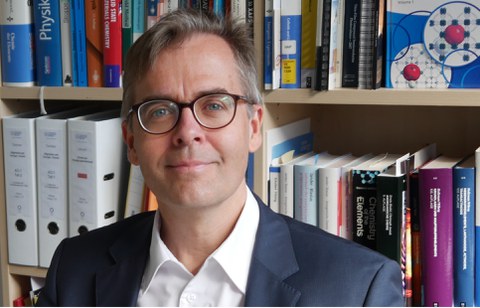Jul 14, 2025
ERC Proof of Concept Grant for groundbreaking hydrogen production technology
Chemist Prof. Stefan Kaskel from TUD Dresden University of Technology has been awarded a Proof of Concept Grant by the European Research Council (ERC) for the project ‘Innovation in Hydrogen Production Energy Efficiency: A Three-Phase Electrolyser (3P-EL)’. This will enable him to further advance the three-phase electrolyser technology he has developed as a sustainable and efficient solution for hydrogen production and to test its market readiness. An important step towards green hydrogen.
The development of sustainable and energy-efficient processes for the production of green hydrogen is a central component of the chemical industry of the future. Stefan Kaskel, Professor of Inorganic Chemistry I at TU Dresden, is working on improving the energy efficiency of electrolysis in this context. Together with his team, he is working on a new electrolysis technology for hydrogen production that requires less energy than conventional electrolysers.
For the further development of this project entitled Innovation in Hydrogen Production Energy Efficiency: A Three-Phase Electrolyser (3P-EL), Kaskel is now receiving a Proof of Concept Grant of 150,000 euros for 18 months from the European Research Council.
The 3P-EL project is developing a completely new technology for producing hydrogen: a so-called three-phase electrolyser. This innovation overcomes key weaknesses of conventional processes and enables more environmentally friendly, cost-effective and energy-efficient hydrogen production. Because the technology works well with renewable energies such as solar and wind and can also be used on a larger scale, it could play an important role in the global transition to a hydrogen-based green energy economy and strengthen its competitiveness compared to other energy sources. Thanks to its robustness and performance, the system is particularly well suited for industrial applications where large quantities of hydrogen are required. This could lead to hydrogen being used even more extensively as an environmentally friendly raw material and energy source in the future.
"Preliminary lab-scale tests have revealed highly promising prospects, demonstrating the system’s ability to achieve approximately 20% lower energy consumption in hydrogen production. These early results indicate strong potential for scaling up the technology, reinforcing its viability for industrial applications. If successfully developed, this advancement could significantly propel green hydrogen production, reduce energy consumption and operational costs, and accelerate the adoption of clean energy technologies," explains Kaskel.
The ERC Proof of Concept Grant:
The ERC Proof of Concept Grant is a funding line from the European Research Council (ERC) aimed at scientists who have already received ERC funding. The aim of the €150,000 grant is to test the innovation potential of their research and enable them to take the first steps towards practical application or market readiness. A recent report shows how the European Research Council's (ERC) Proof of Concept Grants are helping to translate cutting-edge research into concrete solutions for practical application. With just 1% of the ERC's total budget – around €259 million between 2014 and 2023 – some 1,700 projects have been funded, achieving impressive results in terms of innovation, commercialization and cross-sector impact.
In the first round of funding in 2025, 150 of 480 submitted projects were approved with a total funding amount of 22.5 million euros. The next funding round for 2025 is now open; the application deadline is 18 September 2025.
More information:
https://erc.europa.eu/apply-grant/proof-concept
Contact:
Stefan Kaskel
Chair of Inorganic Chemistry I
TU Dresden
Email:
Tel. +49 351 463-33632 (Secretary)

